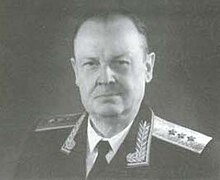Aleksandr Sakharovsky
| Aleksandr Sakharovsky | |
|---|---|
| Александр Сахаровский | |
 |
|
| Personal details | |
| Born | 3 September 1909 Kostroma Oblast, Russia |
| Died | 12 November 1983 |
Aleksandr Michael Sakharovsky (Russian: Александр Михайлович Сахаровский; 3 September 1909 - 12 November 1983) was a Soviet General who was head of the First Chief Directorate (foreign intelligence) of the KGB from 1955 until 1970. Sakharovsky oversaw the KGB foreign intelligence division during some of the key events of the Cold War, including the Hungarian uprising and the Cuban Missile Crisis.
Sakarovsky was born to a working family in Kostroma Oblast, on 3 September 1909. His family moved to Leningrad when he was a child, and he began his career as a plater at the Baltic Shipyard. He was drafted into the Red Army in 1931 and by 1939 was working for the Leningrad NKVD recruiting foreign seamen to work as intelligence agents. During the Second World War he rose to the rank of Major, responsible primarily for counter-espionage against Nazi Germany in the Leningrad region.
In 1946 Sakarovsky was transferred to the MGB, the precursor organisation to the KGB, in Moscow. There he acted in support to Andrey Vyshinsky, a deputy Soviet People's Commissar of Foreign Affairs, during the incorporation of Latvia, Estonia and Lithuania into the Soviet Union during the late 1940s. He was later chief MGB advisor during the establishment the Securitate, the secret police agency of Communist Romania from 1949 to 1953. During his time in Romania he was responsible for the interrogation of Lucrețiu Pătrășcanu, a communist leader critical of Stalin.
...
Wikipedia
